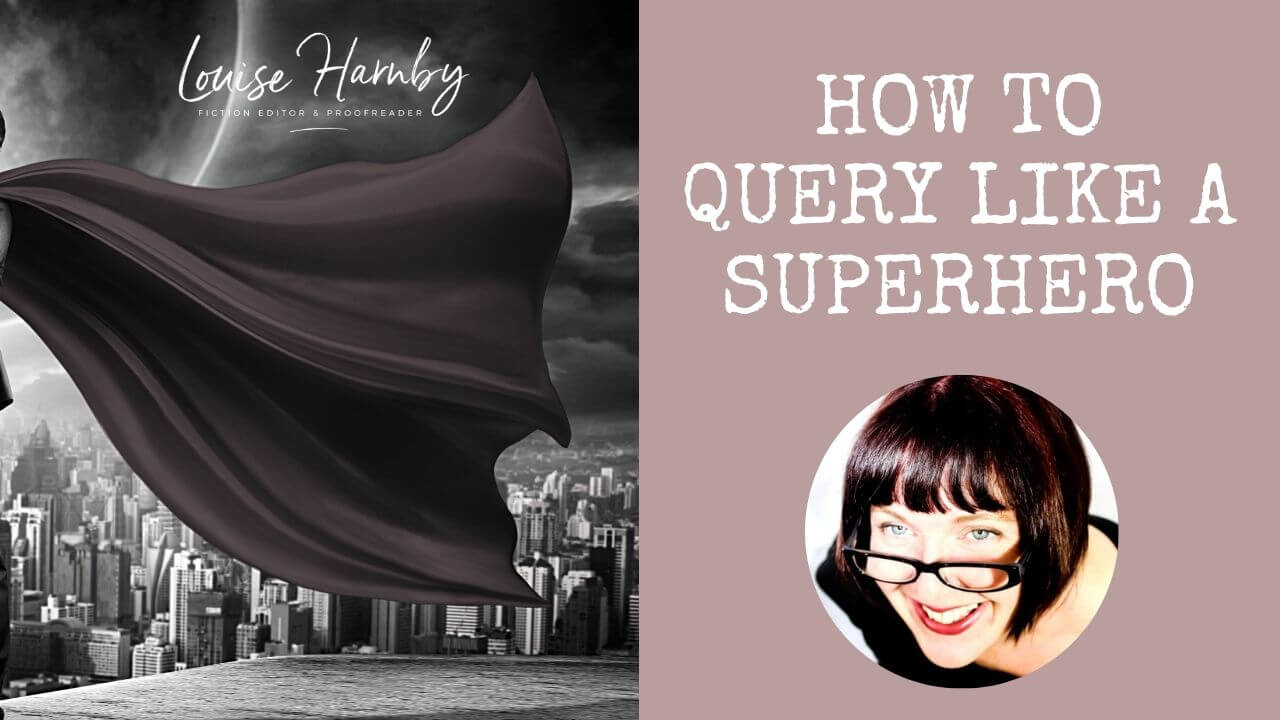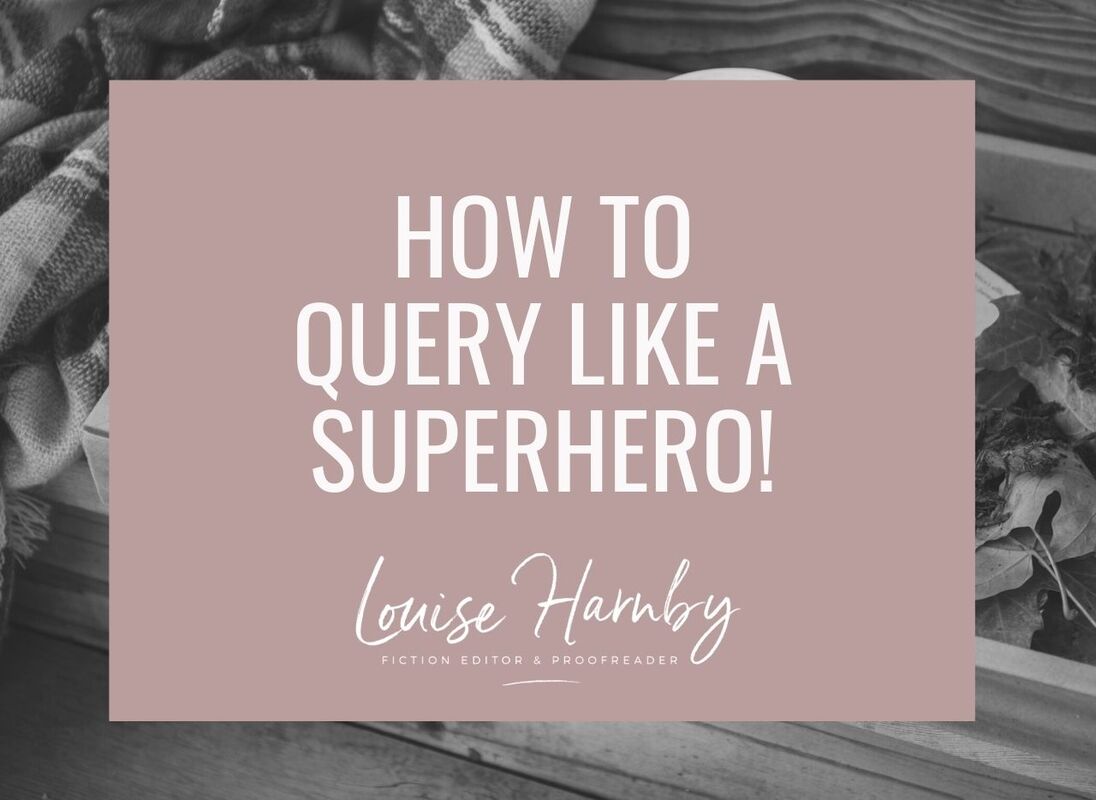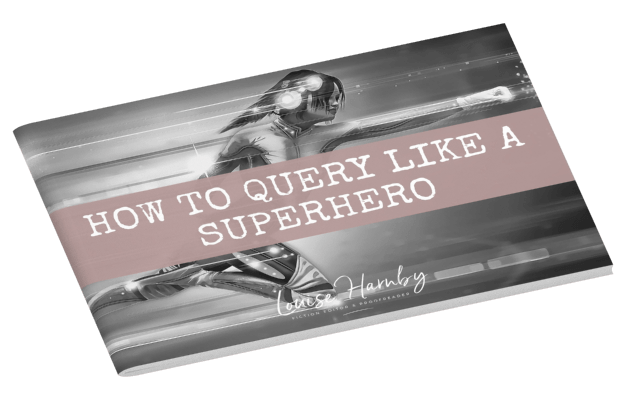|
If you’re new to fiction copyediting (or proofreading), you might struggle to find the balance between changing, querying and leaving well enough alone.
Don’t beat yourself up – even experienced editors labour to find an equilibrium at times, especially those who work with a stream of new-client authors.
Here are 5 tips to help you be a query superhero! And if you fancy downloading them to your preferred device, there’s a PDF at the bottom of the post.
1. Is it meant to be real or imagined? By definition, fiction is made up. There might be people, places, landmarks, buildings, even entire worlds that rest entirely in the mind of the writer. In that case, the author gets to make the rules (e.g. on spelling, environment, even physics) and our job is to check for consistency. Sometimes, though, the people, places, landmarks and buildings exist in the real world. And when there’s a discrepancy (Obama vs Obamah; Elizabeth Tower vs Big Ben) two possibilities emerge: (1) the author has slipped up; (2) the author has deliberately decided to bend reality a little, for any number of reasons. Querying, rather than changing, is essential.
Here’s an example from one of Amy Schneider's fiction-editing master classes:
Example
Schneider tells of a book she edited where the author had included mention of a New York newspaper. She fact-checked it; it had been a real newspaper, but had long ceased to exist by the time the year in which the novel was set had come around. It turned out that this was a deliberate decision on the part of the author, who for personal reasons wanted to keep the paper going in his fictional world. Tactful querying and discussion prevented embarrassment and harm.
LESSON: There’s real, and then there’s really real! Either may be required.
2. When the facts have changed Editors have a wealth of free online research tools at their fingertips. I can’t imagine doing this job thirty years ago! Still, even if we fact-check we might not access ALL the relevant information. Again, tactful querying rather than changing is usually the best way forward. Here’s an example of how my due diligence wasn’t diligent enough. Querying rather than changing saved me:
Example
I copyedited a crime novel in which a character was arrested and his rights were read out to him by a police officer. The wording seemed off to me so I fact-checked. I found what I thought was the correct wording and suggested (rather than changed) a possible recast for the author to use if he thought it appropriate. Good job, too. The author came back to me saying that the wording of the rights had changed in 1994, and that the original was correct given the year in which the scene was set. A big whoops moment for me and a lesson learned. Still, he thanked me for asking first. I still get the shudders thinking about the harm I would have done if I’d actually amended the text directly.
LESSON: Watch your historical context – your diligence needs to be deep enough to take account of it.
3. Be a problem solver Many of my indie authors haven’t taken their books through editorial review, developmental editing and substantive line editing before the file hits my inbox. I do make it absolutely clear what’s included in my service, but sometimes a client might not realize where some of the problems are, or, even if they do, might be stuck on how to fix them. This is where the query needs to go beyond a question and offer a solution. Fiction copyeditors are a little like mechanics, though I have a car so I know what it’s like to sit on the other side of the fence. When I take my car into the garage, I don’t expect to hand over 500 quid (or whatever) in exchange for a list of what’s wrong with my car. I do want to see that list, but I also want to know that the mechanic has solved the problems. For that reason, I think it’s good practice to explain the problem and offer a recast in the comments if we come across a sentence that we feel could do with tightening up or smoothing out. That way, the author can do a simple copy and paste if they like what we’re offering. Even if they don’t like it, it gives them another way of thinking about the text and how they might revise it to solve the problem in their own way (though see ‘Consider your own voice’ below for a cautionary tale!). This example from Erin Brenner (‘Writing Effective Author Queries’), with her author’s hat on, is frightening but illuminating:
Example
'I had a lot of comments that simply said: AU: Revise? No text was changed. No specific words or phrases were highlighted. The entire sentence bore the comment “AU: Revise?” It drove me mad. Revise what? In what way does this sentence need help? For each “AU: Revise?” I had to guess what the copyeditor might have taken issue with. Was everything grammatically correct? Had I missed a style point? A usage rule? How was the sentence not right? As copyeditors, we must remember that when we query, we have a goal: to get the author to make a change we think will help the text. Some authors will easily do so, others won’t. But no author can make corrections if he or she doesn’t know what corrections are wanted.’
LESSON: Problems without solutions (or even explanations) are next to useless for the author. Avoid!
4. Or be an adviser Back to the garage. Sometimes there are problems on the list that the mechanic can’t handle. Again, the same thing can happen to fiction copyeditors whose indie authors would have benefited from developmental work beforehand. And in that case the best we can do is suggest where to go for help. Here’s another example from my own back yard:
Example
I was hired to copyedit what turned out to be the most gorgeous thriller with a generous dose of humour included. The author made me laugh out loud several times in the first four chapters, and in the fifth he made me cry (not with laughter, but because the scene was so moving). I mention this because it’s an indication of how strong the writing was. Most of my edits were mechanical – standardizing dialogue punctuation, dashes, number treatment, spelling, punctuation and grammar. But, every now and then his point of view got a little sticky. POV isn’t something that’s covered by my service and I’m neither trained nor experienced in developmental editing. Nevertheless, I was able to solve the issue elegantly on several occasions because of the context in which the problem arose. However, there were several occurrences that I couldn’t fix. All I could do was flag them up for him, explain why I thought there might be a problem, and offer advice on where to go for help. It wasn’t an ideal situation for either of us, but at least I’d offered guidance. Sometimes that’s the best we can do.
LESSON: Second best sometimes has to suffice. If you can’t fix it, suggest who can.
5. Consider your own voice Given that we’re being paid for our services, our authors need to know that we’re their advocates, and that we’re there to elevate their writing, not criticize how they write. Says Sheila Gagen, ‘… the editor’s task is to serve readability (not, as some authors might think, to hack away at text or, as some editors might think, to point out where an author is wrong). The author wrote the text; he or she must have thought that it did make sense’ (‘The Art of the Editorial Query’). Queries therefore need to have a tone that shows respect and advocacy. Gagen also makes an important point about authors’ varying preferences – how not everyone wants to be hugged and handheld. The thing is, this is tricky to manage unless you’ve worked with the client on previous occasions. Here’s her story:
Example
‘Twice in my career, authors responded to my queries with the same word: “Duh.” (One even took the time to handwrite it in all caps with a few exclamation marks.) Both of those suggested changes were valid, but the authors were sick of my queries and gave up. As a result, they didn’t just lash out at the particular remarks they didn’t like … they ignored other, indisputable edits.’
LESSON: Be an advocate and watch your manners! Choose elevation over criticism.
Gagen recommends discussing the issue before the project starts. It may be that a writer will prefer you to just go ahead and make a substantive edit to the text. Others may want a nudge. Others will prefer a more detailed explanation in the comments. And given that we’re trying to help our authors avoid reader disengagement, it would be a shame if, through hitting the wrong tone, we ended up disengaging our clients. Adrienne Montgomerie offers further food for thought: ‘When you’re worn out, incredulous, and exasperated, it can show in your queries.’ Eek! To think that, despite our best efforts at advocacy, we might have made our author feel we’re no longer on their side, is unthinkable, and yet it can happen. She offers a handy list of different phrases you might consider when querying to keep your author engaged and your tone on track (‘10 Ways to Word a Sensitive Query’). I hope you’ve found these tips useful. Here’s your PDF mini-booklet if you fancy downloading the post to your device. Just click on the image to get your copy.
Louise Harnby is a line editor, copyeditor and proofreader who specializes in working with crime, mystery, suspense and thriller writers.
She is an Advanced Professional Member of the Chartered Institute of Editing and Proofreading (CIEP), a member of ACES, a Partner Member of The Alliance of Independent Authors (ALLi), and co-hosts The Editing Podcast. Visit her business website at Louise Harnby | Fiction Editor & Proofreader, say hello on Twitter at @LouiseHarnby, connect via Facebook and LinkedIn, and check out her books and courses.
9 Comments
Great examples!
Reply
Louise Harnby
9/5/2017 09:51:36 am
Cheers, Lola!
Reply
9/5/2017 04:36:26 am
What a great post - giving quality guidance can be a minefield depending on whom you're working with, and how sensitive / sure they are about what they've written and why. Striving for elevation over criticism is a good lesson. I always endeavour to be precise but not prescriptive, to lift but not limit.
Reply
Louise Harnby
9/5/2017 09:56:47 am
Hi, Sara! Ooh, I love that: to be precise but not prescriptive, to lift but not limit. Beautifully articulated!
Reply
Louise Harnby
23/5/2019 01:25:55 pm
Cheers, Sally!
Reply
Mary
23/5/2019 01:06:24 pm
Hi Louise
Reply
Louise Harnby
23/5/2019 01:12:13 pm
Hi, Mary.
Reply
Mary
23/5/2019 01:14:15 pm
Ah, that's interesting. I do lots of too-ing and fro-ing with most of my authors. Thanks for the reply. Leave a Reply. |
BLOG ALERTSIf you'd like me to email you when a new blog post is available, sign up for blog alerts!
TESTIMONIALSDare Rogers'Louise uses her expertise to hone a story until it's razor sharp, while still allowing the author’s voice to remain dominant.'Jeff Carson'I wholeheartedly recommend her services ... Just don’t hire her when I need her.'J B Turner'Sincere thanks for a beautiful and elegant piece of work. First class.'Ayshe Gemedzhy'What makes her stand out and shine is her ability to immerse herself in your story.'Salt Publishing'A million thanks – your mark-up is perfect, as always.'CATEGORIES
All
ARCHIVES
July 2024
|
|
|
|


















 RSS Feed
RSS Feed





